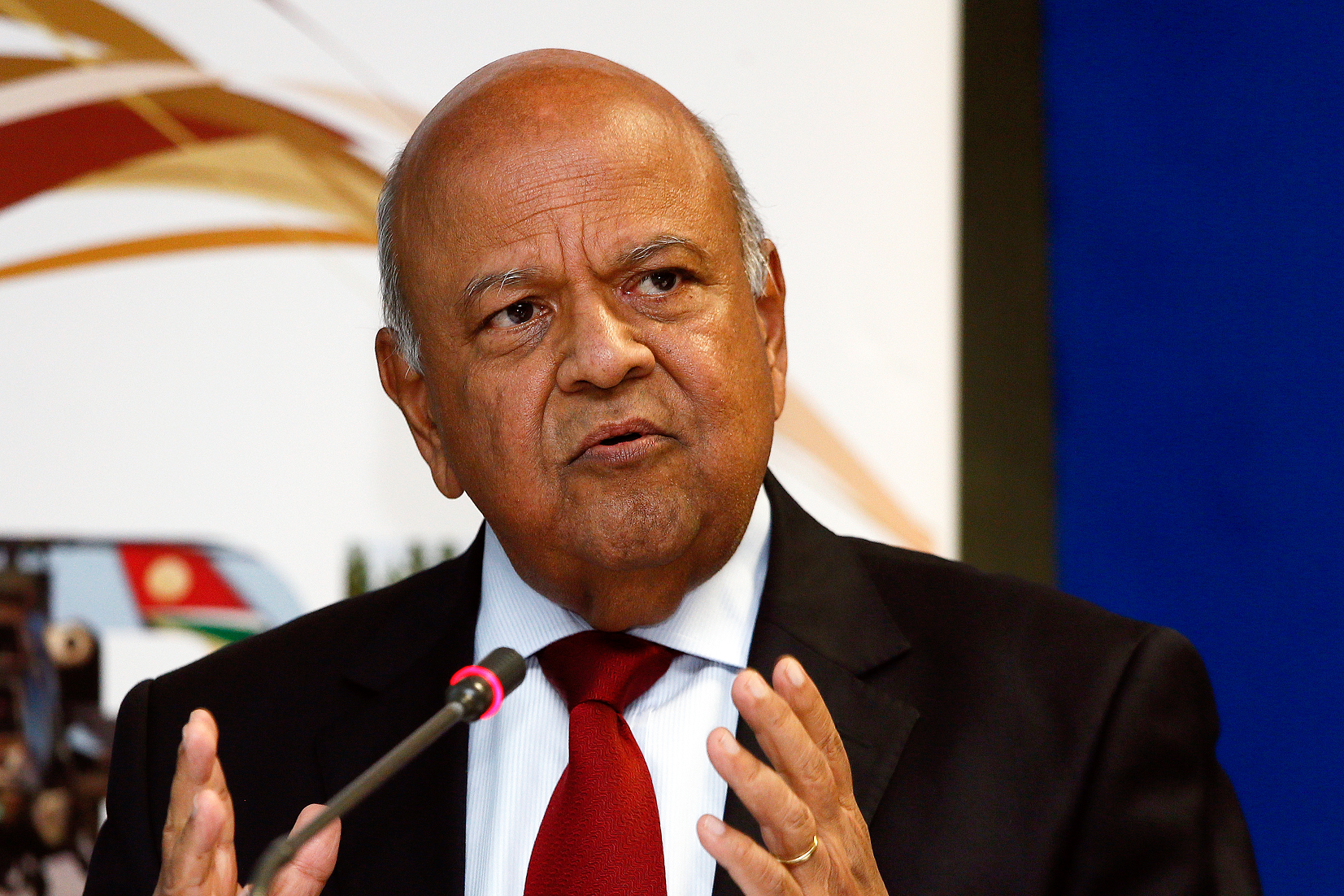
South African minister Pravin Gordhan has been facing questions over his pharmacy degree. Two institutions confirm that he graduated
- This article is more than six years old.
- Published on July 10, 2019 at 21:12
- 3 min read
- By AFP South Africa, Tendai DUBE
One Facebook post, which we’ve archived here, reads: “Gordhan is degree less. Kuthiwa (they said in Xhosa) nobody seen him graduating as a Pharmacist in varsity. Kuthiwa it may happen that he was a fake pharmacist who was practicing without the qualifications…”
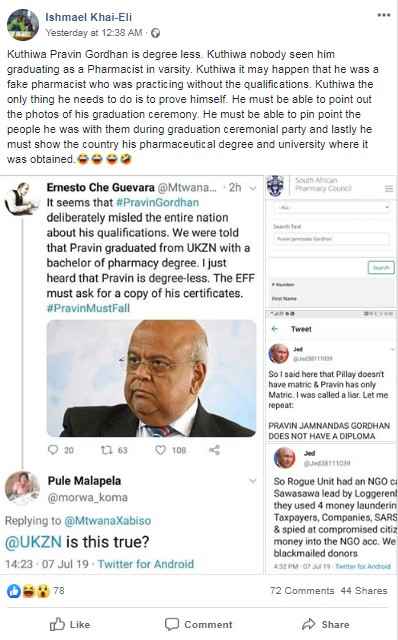
Numerous posts raising doubts over Gordhan’s qualifications can be found on Twitter and Facebook, including here and here.
As evidence of the claim that Gordhan never graduated, the first post was accompanied by a screenshot of a search on the South African Pharmacy Council (SAPC) website showing no results for his name.
But the website also says registered persons are “all professionals practising in the pharmacy profession as well as learners and students”.
Gordhan is neither a serving pharmacist, nor a student.
He has held a string of government jobs since the 1990s, not leaving much time for pharmacy. The SAPC confirmed in a tweet that Gordhan was registered with the council from January 1975 until May 1997. He was already a member of parliament by the time he was taken off the register.
Based on numerous requests, we hereby confirm that Minister Pravin Gordhan is a qualified non-practicing pharmacist, and that he was registered with the @OfficialSAPC from January 1975 until May 1997.
— South African Pharmacy Council (@OfficialSAPC) July 9, 2019
The SAPC website explains the deregistration process in legal terms here, and a more extensive list can be found under the Pharmacy Act 53 of 1974.
The tweet from the SAPC comes after a statement from the University of KwaZulu-Natal (UKZN) confirming “Gordhan studied and successfully completed the requirements for the degree Bachelor of Pharmacy in 1973”.
MEDIA STATEMENT
— University of KZN (@UKZN) July 8, 2019
8 July 2019
Confirmation of Qualifications: Pravin Gordhan graduated from UKZN pic.twitter.com/Hf4ClPEm1K
UKZN was formed in 2004 from a merger between the University of Durban-Westville and the University of Natal.
Some social media users felt the universty's statement was not enough evidence of Gordhan’s qualifications, speculating on how he could have completed a pharmacy degree in only one year as they believed UDW was established in 1972.
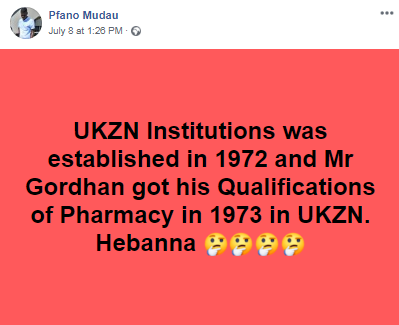
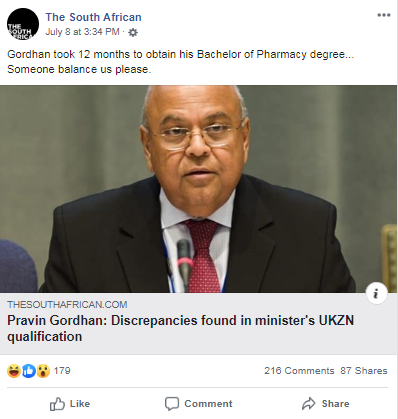
UKZN has faced scandals in the past with regard to placement fraud and degree fraud, as raised by this report and a speech last December from the then minister of higher education.
But the history of apartheid accounts for some of the confusion over Gordhan’s education records. Gordhan went to the University College for Indians on Salisbury Island, which was established in 1961. The institution was renamed UDW in 1972 when it was granted university status and relocated to Westville.
Higher education minister Blade Nzimande explained the background in this Facebook post:
The recent social media inquisition was apparently prompted by the resurfacing of a 2016 tweet by verification organisation Africa Check.
@UKZN Please let us know when we can expect a response to our query regarding Pravin Gordhan's qualifications?
— Africa Check (@AfricaCheck) March 11, 2016
According to his biography on the South African government’s website, Gordhan worked as a pharmacist at a Durban hospital from 1974 to 1981. He became involved in the underground anti-apartheid movement in the 1980s, and was detained three times.
This 1982 article from SASPU National -- a non-profit newspaper produced by the South African Students’ Press Union between 1980 and 1987 -- documents the campaign at the time to help Gordhan get reinstated to his job after his detention.
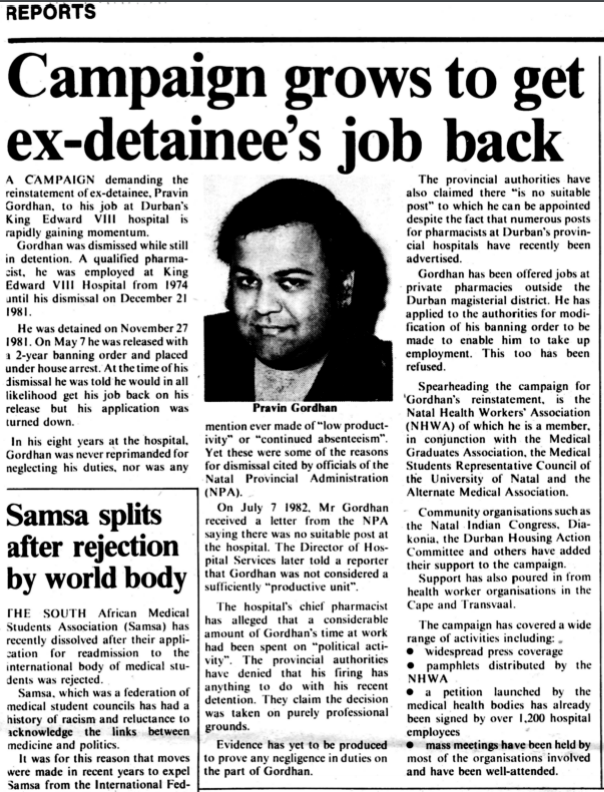
As reported by AFP, the battle over Pravin Gordhan’s reputation is at the heart of a power struggle within the ruling ANC party.
Gordhan is seen as the right-hand man of President Cyril Ramaphosa, who ousted scandal-tainted Jacob Zuma from power last year.
Copyright © AFP 2017-2026. Any commercial use of this content requires a subscription. Click here to find out more.
Is there content that you would like AFP to fact-check? Get in touch.
Contact us
